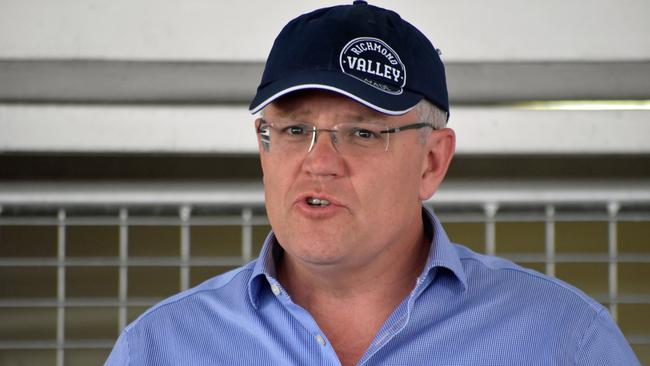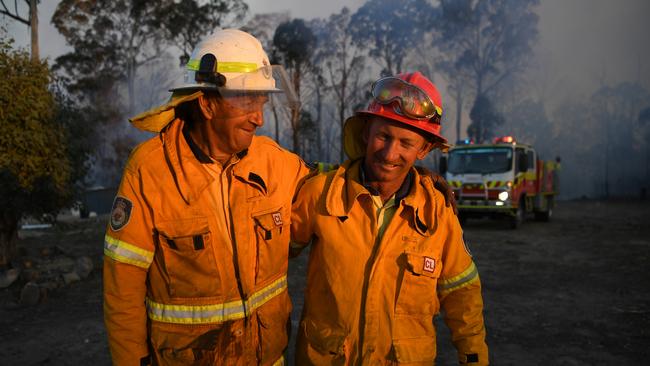Sharri Markson: The political climate has changed but climate policy won’t
Renewables are growing fast but that won’t take the heat off the Coalition, writes Sharri Markson.
Opinion
Don't miss out on the headlines from Opinion. Followed categories will be added to My News.
- Thousands gather in Sydney CBD for bushfire, climate rally
- As Australia burns, PM must address climate change
Neither of Australia’s two major political parties have an overarching climate change policy to reduce Australia’s CO2 emissions. This is not going to change anytime soon. On either side.
In the upper echelons of the Morrison government, the view is there has been a shift in the way the public considers climate change, but not to the degree that the ABC, Guardian and Twitterati make out.

One senior conservative said despite the mounting campaign for climate change action after the worst bushfire season on record, the Coalition’s policy will not change.
What will change is how climate change is spoken about by the government.
“This (the fires) will change rhetoric and communication and style and tone but it will not change policy. We’re already doing a load of stuff. We can’t do more.”
Malcolm Turnbull lamented in a piece for TIME this week that the government “has had no coherent, integrated climate and energy policy”.
Even Turnbull’s own moderate faction, however, are not at a federal level demanding a new policy.
Yes, they are putting pressure on the government for more action.
And when parliament returns, and the bushfire crisis and recovery efforts have come off the front pages, moderate MPs will want to meet with Morrison to demand carry-over credits no longer be used to reach the Paris targets and to discuss what more can be done to reduce emissions.
Already moderate MPs have raised the issue at the highest level with Deputy Leader and Treasurer Josh Frydenberg.
These are MPs who represent electorates where, they say, the issue of climate change has “reached fever pitch”.
“I think there is a shift on inside the government,” one said.

The issue will also potentially be raised in the party room but the National Energy Guarantee will not be revisited.
“Everyone accepts it has to be within the parameters of the election commitments,” one MP said.
The public appetite for a climate change policy has waxed and waned over the past two decades.
In 2007, pre-GFC, Australians were convinced by an insurgent Kevin Rudd that climate change was the greatest moral challenge of our time, and were prepared to pay for action even.
But when Rudd himself gave up the fight, the public did too.
And by the time Julia Gillard lied about a carbon tax, the appetite for it had entirely disappeared, particularly as economic times were tougher.
Public sentiment is now again changing in the wake of the unprecedented bushfire crisis.
Not only did the fires hit multiple jurisdictions but the smoke blanketed the inner-city areas of Sydney, Melbourne and Canberra.
Climate change did not cause the bushfires but exacerbated their severity, with the preceding drought creating an exploding tinderbox of conditions.
Of course, this was not helped by arsonists and the amount of fuel-load in the bush — the result of state government incompetence.

Morrison will not buckle under media or moderate faction pressure to develop an overarching policy to reduce emissions.
As he has said at press conferences: “Our policy is to meet and beat our targets.”
The Prime Minister’s view is that a new, integrated emissions-reduction policy is not necessary because emissions are coming down and Australia’s international commitments will be met.
His comments are inexplicably dismissed by critics but research indicates what he is saying is accurate.
The Department of Environment and Energy’s report, titled Australia’s Emissions Projections 2019, released in December, shows that by 2030 the renewable share of generation is expected to hit 48 per cent.
If these projections hold true, Australia would well and truly have surpassed the Paris commitments of between 26 and 28 per cent by 2030.
A February 2019 report from the Australian National University broadly supports this view.
The report found Australia is installing renewable energy faster per capita than other countries and that our “electricity sector is on track to deliver Australia’s entire Paris emissions reduction targets five years early, in 2025”.
“Australia is on track for deep and rapid greenhouse emissions reductions through deep renewable electrification. Much of the world can readily follow the Australian path,” the researchers found.

Yet, the view — internationally and among voters — is that the Morrison government denies climate change and is slow to act.
This is a result of some irresponsible fake news from media outlets such as The Guardian and ABC, along with confusion that climate deniers such as Craig Kelly actually speak for official government policy.
There is a widespread view among conservative and moderate MPs that Morrison needs to do a more persuasive job of convincing voters that the government is meeting its international commitments.
While not going so far as to release an entire new emissions-reduction policy, the government will release a Technology Investment Roadmap for emissions reductions and work to reduce emissions in the transport, agriculture and industrial sectors, while seeing if there’s further potential in the energy sector to further advance the use of renewables.
There will also be the release this year of the “electric vehicle strategy” which Alan Tudge and Angus Taylor have eagerly been working on.
When parliament returns, there is no question the political agenda will centre on the Coalition’s climate change response in the wake of the bushfires.
But there will be pressure on Labor, too. Following its election loss, when Bill Shorten was stumped when pressed on the economic cost of Labor’s ambitious climate policy, its targets are now also under review.
Tony Burke this week struggled to answer questions about Labor’s policy in an ABC interview.
Eight months on from the federal election, Anthony Albanese seems to be in no rush to settle on an integrated emissions-reduction policy anytime soon.
Because the rifts within Labor’s ranks on just how ambitious the party should be when it comes to action on climate change run as deep as within the Coalition.
